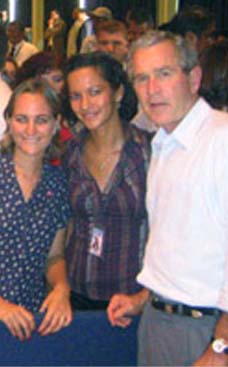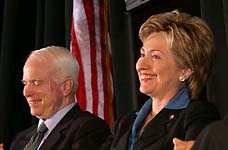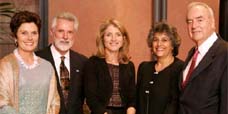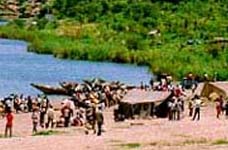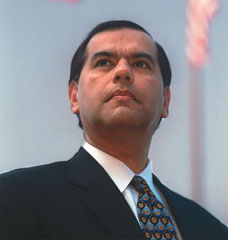
"I appreciate the Peace Corps Director Gaddi Vasquez for joining us"
Bush recognizes Director Vasquez on World AIDS Day
Remarks by President Bush and Mrs. Bush on World AIDS Day
Thursday December 1, 12:21 pm ET
WASHINGTON, Dec. 1 /PRNewswire/ -- The following is a transcript of remarks by President Bush and Mrs. Bush on World AIDS Day:
Room 450
Dwight D. Eisenhower Executive Office Building
10:08 A.M. EST
MRS. BUSH: Good morning, everyone. Good morning and thank you all very, very much for joining us on this important day, World AIDS Day. World AIDS Day highlights the work that is going on around the world to prevent and treat HIV/AIDS.
The people of the United States are making an important contribution to this effort, through medical expertise, funding, research, and the compassion of our people. Through President Bush's Emergency Plan for AIDS Relief, America is keeping its promise to help hundreds of thousands of people prevent, treat, and live with HIV/AIDS.
In July I visited three countries in Africa, and there I met people whose lives are better, thanks to the President's Emergency Relief Plan. In South Africa, women at the Mothers To Mothers-To-Be Clinic are working to prevent the transmission of HIV from mothers to their unborn children. Mothers who have been through the program help HIV-positive mothers who are now pregnant and need guidance and strength from someone who has walked in their shoes. The President's Emergency Plan supports this work, and all Americans can be very proud of that.
The women and staff at Mothers To Mothers-To-Be, including Robin Smalley, who is here with us today, are -- were a wonderful host to me. Where is Robin? Oh, good -- right on the very front row. Hey, Robin. (Laughter.) I'm also really pleased to announce that I'll host them, welcome them to the White House this spring.
On World AIDS Day we make the commitment to one day see a generation free from HIV/AIDS.
It's now my pleasure to introduce a leader in the global effort to prevent HIV/AIDS -- my husband, President George Bush. (Applause.)
THE PRESIDENT: Thank you all. How about my line of work, where you get introduced by your wife? (Laughter.) And I'm glad I got introduced by Laura, because she deeply cares about the issue of HIV/AIDS. She's a great First Lady with a compassionate heart. In her travels, she's carried a message of hope for the suffering -- and a message that the empowerment of women is essential to the prevention of AIDS. I thank you for your introduction. More importantly, I thank you for your love.
I want to thank you all for coming, and for joining the government, and more importantly, the armies of compassion in challenging -- in the challenge of fighting AIDS. I want to thank Secretary Rice for being here, Secretary of State. The Secretary of Defense is with us, Secretary Rumsfeld. Carlos Gutierrez, Secretary of Commerce; Secretary of Labor Elaine Chao; Mike Leavitt, who is the Secretary of Health and Human Services; USAID Director Andrew Natsios is with us.
Ambassador Randy Tobias, who is the U.S. Global AIDS Coordinator, and has done a heck of a job. Thank you for being here. (Applause.) CDC Director Dr. Julie Gerberding; Tony Fauci is with us as well; Elias Zerhouni of the NIH -- thank you all for being here. Thanks for being -- making sure the scientific community stays on the leading edge of research to help save lives.
I appreciate the Peace Corps Director Gaddi Vasquez for joining us. I'm proud that two United States Senators have taken time out of their busy schedules to join us -- Senator Dick Lugar and Senator Mike Enzi. Thank you all for being here. It means a lot. (Applause.)
Finally, I want to thank the diplomatic corps for joining us. You're going to hear a strong message of support, and I know you'll relay this message back to your governments, along with a message that in order to deal with HIV/AIDS we must confront it honestly. We're glad you're here, your Excellencies. Thank you for joining us.
Today, with people around the world, not just here in America, but all around the world, 40 million -- we turn our thoughts to the more than 40 million men, women, and children who are living with HIV. That's what World AIDS Day is all about. And on World AIDS Day, we renew our commitment to turn the tide against this disease.
HIV/AIDS is a global health crisis -- it is also a daily burden for many of our families and neighbors and friends. Across Africa, this pandemic threatens the stability and the future of whole societies. In Asia, HIV/AIDS is a challenge that grows daily and must be confronted directly. Here in the United States, over a million of our citizens face this chronic condition. At the start of this century, AIDS causes suffering from remote villages of Africa to the heart of America's big cities. This danger is multiplied by indifference and complacency. This danger will be overcome by compassion, honesty, and decisive action.
I believe America has a unique ability, and a special calling, to fight this disease. We are blessed with great scientific knowledge. We're a generous country that has always reached out to feed the hungry, and rescue captives, and care for the sick. We are guided by the conviction of our founding -- that the Author of Life has endowed every life with matchless value.
Here in America, some of our fellow citizens have now lived 15 years or more with HIV/AIDS. The federal government provides more than $17 billion a year to help people in America living with HIV/AIDS -- including funding that brings life-saving drugs and treatment to hundreds of thousands of low-income Americans. With the help of medicine, and their own daily courage, many people are managing a condition that was once uniformly fatal -- and proving that HIV/AIDS is a long-term illness like heart disease or diabetes.
Yet America still sees an estimated 40,000 new infections each year. This is not inevitable -- and it's not acceptable. HIV/AIDS remains a special concern in the gay community, which has effectively fought this disease for decades through education and prevention. And the demographics of this disease continue to change. AIDS is increasingly found among women and minorities. Nearly half of the new infections are found in the African-American community.
We're determined to make voluntary HIV testing a routine part of health care in America -- so people can know the truth about their status, tell others, and get the treatment they need. We're determined to end mother-to- child transmission of HIV in America -- because medicine makes it possible, and conscience demands it. We're determined to improve care for minorities and citizens in the greatest need, and so I urge the Congress to reauthorize the Ryan White Care Act. (Applause.)
Our concern about HIV/AIDS does not stop at our borders. Other nations face greater challenges, yet they are moving forward with courage and determination that inspires our respect, and deserves our support. Nations like Uganda and Kenya have demonstrated that leadership and honesty can overcome stigma and reduce rates of infection. Nations like Botswana and Namibia have shown that anti-retroviral treatments can be widely delivered and highly successful. These countries, and many others, are fighting for the lives of their citizens -- and America is now their strongest partner in that fight, and we're proud to be so.
We're supporting our partners through the Global Fund, which is helping nations purchase medicines and treat tuberculosis, the deadly infection that often accompanies AIDS.
We are also supporting our partners through the Emergency Plan for AIDS Relief, the largest initiative in history to combat a specific disease. This effort is designed to support and strengthen the AIDS-fighting strategies of many nations, including 15 heavily afflicted nations in Africa, Asia, and the Caribbean. In May 2003, we committed $15 billion over five years to meet specific goals: to support treatment for 2 million people; support prevention for 7 million people; support care for 10 million people.
We're working with our partners to provide treatment because the lives of people already infected should never be written off, because the best way to help a child in need is to help their parents live, and because people who know they can be treated are more likely to seek testing. We're working with our partners to expand prevention efforts that emphasize abstinence, being faithful in marriage, and using condoms correctly. This strategy -- pioneered by Africans -- has proven its effectiveness, and America stands behind the ABC approach to prevention. (Applause.)
And we're working with our partners to expand compassionate care -- especially for the millions of children made orphans by this cruel disease.
The United States Congress and the American people have been generous in this effort, and Americans can know that their generosity is making a significant difference. Before the Emergency Plan for AIDS Relief, only 50,000 people of the more than 4 million people in sub-Saharan Africa needing immediate AIDS treatment were getting medicine -- think about that, only 50,000 people. After two years of sustained effort, approximately 400,000 sub- Saharan Africans are receiving the treatment they need. (Applause.)
Today I'm proud to welcome Thandazile Darby and her two children, Lewis and Emily. Lewis, by the way, is age 4; Emily, age 5 -- and their doctor, Dr. Helga Holst. They're from South Africa. Welcome to America. (Applause.)
It's the effects of a long speech. (Laughter.) Two years ago, she took Emily to the hospital for what she thought was the mumps -- later they found that Emily, and the rest of the family, were HIV-positive. Thandazile's late husband's relatives tried to support her treatment for as long as they could, but the cost was too high. Thanks to the Emergency Plan funds, the Darbys began to get the treatment they desperately needed. Soon these children will start school -- and now their mom dreams that someday they will attend college. Here is what Thandazile says: "The medicine used to be very expensive. I used to have to decide between taking our medicine and putting food in our bellies. It was difficult, because we needed to have food in our bellies so that we could take the pills. Now I can afford to buy food for my family and we can keep taking our medicine to stay healthy."
I want to thank you for joining us today, and I want to thank for your strong example of courage. (Applause.)
This example is repeated across Africa and beyond. In Northern Namibia, Emergency Plan funds helped a Lutheran hospital build a new HIV treatment center and hire 12 doctors, and nurses, and other staff. As a result, this clinic has been able to put 1,475 people on treatment in less than a year. In Botswana, Emergency fund -- Plan funds are supporting two clinics to launch a peer counseling program for mothers to provide emotional support and prevent mother-to-child transmission of HIV/AIDS. In Uganda, Emergency Plan funds helped Dr. Peter Mujenyi expand from one site serving those with AIDS to 25 sites in a single year. Today, there are 35 sites -- many of them in remote rural areas -- that provide treatment to 35,000 of his countrymen. I first met Peter more than two years ago. This man is an incredible leader. He's an incredibly compassionate soul. I want to thank you for being a lifesaver and thank you for joining us. (Applause.)
We're making good progress, and none of it would be possible without the devotion and professionalism of our partners on the ground: courageous leaders of African nations who care about their people and who tell the truth; doctors and pharmacists who work without rest in overcrowded wards; health workers, often with HIV themselves, who visit homes and make sure people are taking their medicine; people who run youth groups and clubs that encourage abstinence and help children with HIV face the challenges of life. Many of these good people who serve others are also motivated by their deep faith. And we want to expand these partnerships.
So today I am pleased to announce the New Partners Initiative. Through this initiative, which is part of the Emergency Plan, we will further reach out to our faith-based and community organizations that provide much of the health care in the developing world, and make sure they have access to an American assistance. By identifying and supporting these organizations, we will reach more people, more effectively, and save more lives. (Applause.)
Americans have always stood for human dignity when history calls. When the nations of Europe lay in rubble after World War II, America helped build a brighter future with the Marshall Plan. When the developing world looked for help and inspiration, we sent the Peace Corps to lay new foundations for friendship. And now, as millions afflicted with AIDS reach out for help, the American people are once again responding. On this World AIDS Day, we are proud to stand with our friends and partners in this urgent struggle. And every life we help to save makes us proud to be Americans.
I want to thank you all for your good work; thank you for joining us today. May God bless those who suffer, and may God continue to bless our country. (Applause.)






